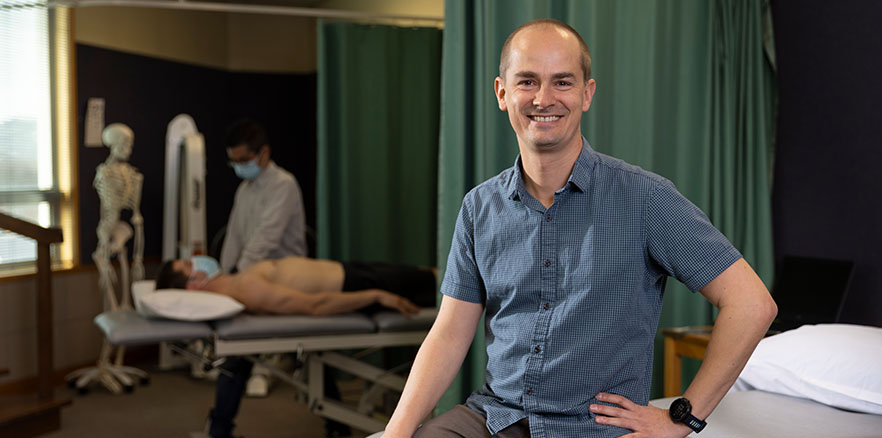
Associate Professor Daniel Ribeiro
A judo injury as a teenager in Brazil is one of the more unusual impetuses for an academic career at the University of Otago.
Born and raised in Brazil, Associate Professor Daniel Ribeiro (Physiotherapy) ruptured an elbow ligament while taking part in judo in his teens, and went through a musculoskeletal rehabilitation programme which helped restore movement and muscle strength.
“It was not a nice experience having the injury and it was painful to regain movement,” Ribeiro recalls, “but the physiotherapist was amazing and I am passionate about sport and exercise, so I decided to train as a physiotherapist.”
He graduated in physiotherapy and undertook postgraduate studies in human movement sciences, then worked as a clinician and taught undergraduate students in Brazil, before completing a PhD at Otago and joining the staff in 2013.
“Otago has an excellent reputation internationally, so when I saw an opportunity for PhD scholarships I applied for one and got it. My wife and I enjoyed Dunedin and we ended up staying.”
“Otago has an excellent reputation internationally, so when I saw an opportunity for PhD scholarships I applied for one and got it. My wife and I enjoyed Dunedin and we ended up staying.”
Based in the Centre for Heath, Activity and Rehabilitation Research, Ribeiro is engaged in research that aims to improve clinical outcomes for people with musculoskeletal pain due to injuries and disorders, with a focus on shoulder pain.
He says shoulder pain is a common musculoskeletal complaint that impacts on daily living and occupational activity, and can have a slow recovery despite the benefits of standard exercise therapy on shoulder pain and function.
Part of the research focuses on understanding the underlying mechanisms of musculoskeletal disorders and why particular interventions work. This involves laboratory-based studies: testing participants with no symptoms and volunteers with shoulder pain, mostly people on waiting lists who are not supported by ACC.
“The lab-based studies are fine in helping to explain how an intervention might work,” Ribeiro says, “but we are also interested in designing and testing novel rehabilitation programmes that are needed to improve the effects of treatment and the speed of recovery, and to reduce the rates of recurrence, so that people can get back to their normal lives.”
Further research projects involve clinical trials to see if interventions that are tailored to an individual's impairments are better than a one-size-fits-all approach; and to see if different healthcare pathways can reduce waiting lists, the onset of chronic conditions and the need for surgery.
Ribeiro's current research team includes Honours student Tom Fahey and PhD student Tim Wang. He is also collaborating with international researchers and colleagues from the School of Physiotherapy and the Division of Health Sciences, including Professor Haxby Abbott, Associate Professor Meredith Perry, Associate Professor Gisela Sole, Dr Cathy Chapple, Dr Ram Mani, Dr Ross Wilson and Dr Jimmy Zeng.
Ribeiro has continued to experience the odd minor injury, which is understandable, given he takes part in half-marathons and triathlons for fun, when he is not relaxing with his family.
Recent awards
- University of Otago Early Career Award for Distinction in Research (2018)
- Sir Charles Hercus Health Research Fellowship (2018)
- HRC Feasibility Grant (2017)
- Health Research Council – Emerging Researcher First Grant (2015)
- Lottery Health Grant (2015)
Funding
- Health Research Council of New Zealand
- New Zealand Manipulative Physiotherapy Association
- Otago Medical Research Foundation
- University of Otago Research Grant
- Stanley Paris Fellowship Award
More stories about early career researchers
This story is part of the research publication 'He Kitenga 2022: Talented Futures', which presents the different pathways into research that early career researchers follow.
